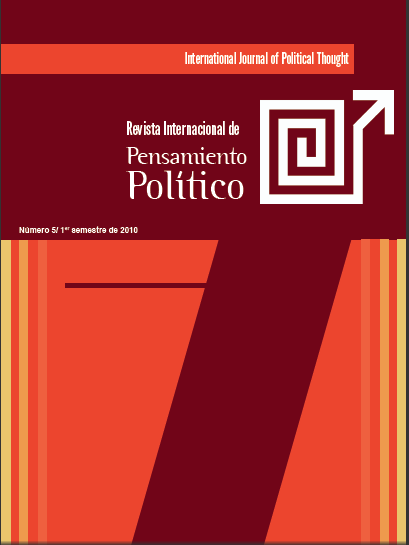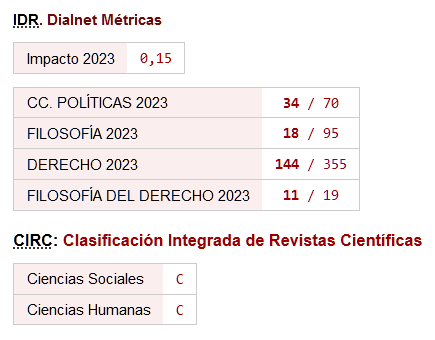Razón práctica, lo mecánico y teoría legal en Hobbes: la legalización de los político
DOI:
https://doi.org/10.46661/revintpensampolit.1857Palabras clave:
Lo político , Imperio de las leyes , Razón práctica, Teoría legal, HobbesResumen
El gran teórico del gobierno por imperio de las leyes, Thomas Hobbes, continua ejerciendo influencia hoy en día en nuestras concepciones de la ley y de lo político. Su teoría política del gobierno por imperio de las leyes es fundamentada de forma importante en un peculiar concepto de razón práctica. Se trata ésta de una noción compleja que tiene su origen en concepciones mecanicistas de la naturaleza, en ebullición durante el siglo XVII, así como en posiciones políticas en favor del individualismo. Un análisis crítico de la teoría del imperio de las leyes de Hobbes y de su concepto de razón práctica ilumina la tarea de comprender el orden internacional actual.
------------------------------------------------------------------------
The great theoritician of the rule of law, Thomas Hobbes, continues to have an influence in present conceptions of law and politics. His political theory of a system of government in which law rules is to a great extent founded on a peculiar concept of practical reason. The latter is a complex notion, having origin in the mechanistic conceptions of nature arising in the XVII. It has to be traced back to political tendencies in favour of individualism. A critical analysis of Hobbes rule of law and of his concept of practical reason sheds light on the task of understanding current international order.
Descargas
Citas
Dyzenhaus, David, «Hobbes’s Constitutional Theory» en Hobbes, T., & Shapiro, I. (2010). Leviathan, or, The matter, forme, & power of a common-wealth ecclesiasticall and civill. New Haven: Yale University Press.
Gierke, O.,Althusius J. Die Entwicklung der naturrechtlichen Staatstheorien. Breslau. 1913, pp. 226-234.
Hobbes, S.J. Hoekstra, The Savage, the Citizen, and the Fool: the Compulsion for Civil Society in the Philosophy of Thomas Hobbes, D.Phil. Dissertation, Oxford University, 1998.
Hobbes, Thomas, Leviatán: o la materia, forma y poder de una república eclesiástica y civil, Sánchez Sarto, M., trad., Editorial de la Universidad de Puerto Rico, 1995.
Oakeshott, Michael ‘Introduction’ a Hobbes’s Leviathan, Basil Blackwell Oxford, 1946, p. viii.
Skinner, Q., ‘Hobbes on Representation’, European Journal of Philosophy 13 (2005) pp. 155-184. DOI: https://doi.org/10.1111/j.0966-8373.2005.00226.x
Tönnies, Ferdinand, Studien zur Philosophie und Gesellschaftslehre im 17. Jahrhundert, Hrsg. E.G. Jacoby , Frommann-Holzboog, Stuttgart-Bad Cannstatt, 1975, p. 36.
Tuck, Richard, «Hobbes and Democracy», en Annabel Brett & James Tully eds., Rethinking the Foundations of Modern Political Thought, Cambridge University Press, 2006, pp. 171-192. DOI: https://doi.org/10.1017/CBO9780511618376.011
Descargas
Publicado
Cómo citar
Número
Sección
Licencia
Derechos de autor 2016 Revista Internacional de Pensamiento Político

Esta obra está bajo una licencia internacional Creative Commons Atribución-NoComercial-CompartirIgual 4.0.
Política de acceso abierto
Se permite el acceso libre y abierto de cualquier interesado a todos los contenidos de los números de la revista, sin costo alguno, pudiendo imprimir y trasladar todos los artículos, con la única condición de precisar la fuente y la autoría.
La revista: a) no cobra a las autorías costes por el procesamiento de los artículos ni por el envío de los mismos, b) mantiene el copyright para los autores sin restricciones, c) facilita a los autores conservar sus derechos de publicación sin limitaciones.
La Revista Internacional de Pensamiento Político es una obra original del Laboratorio de Ideas y Prácticas Políticas de la Universidad Pablo de Olavide. Todos los artículos incluidos en la Revista son obra original de sus respectivas autorías. Esta Revista se ofrece libremente a la comunidad científica y académica sin coste alguno y libera los contenidos de acuerdo a la licencia "Reconocimiento-NoComercial-CompartirIgual 4.0 CC BY-NC-SA" del proyecto Creative Commons dispuesta en la siguiente url: https://creativecommons.org/licenses/by-nc-sa/4.0/legalcode
Si deseas traducir o compilar alguno de los artículos aquí disponibles, por favor, ponte en contacto













